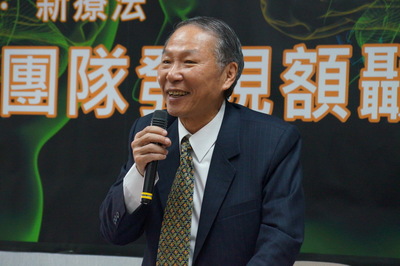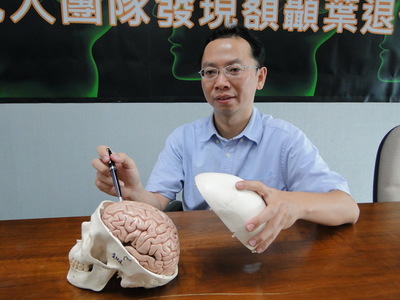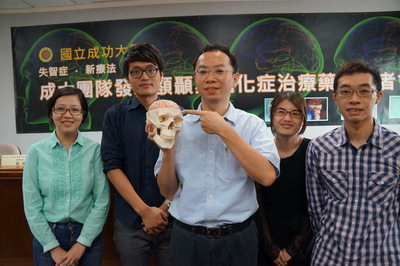Possible cure for dementia found by Taiwan researchers



Tainan, Taiwan, 26 September 2012
A southern Taiwan-based National Cheng Kung University (NCKU) research team has discovered that rapamycin, a drug as a autophagy activator is a possible treatment to alleviating frontotemporal lobar degeneration (FTLD), one of the mainly causes of dementia, and so far no medication can be used.
The medical breakthrough made by the team led by Kuen-Jer Tsai, professor of the Institute of Clinical Medicine and Institute of Basic Medical Science, NCKU, was published in Proceedings of the National Academy of Sciences of the United States of America, PNAS on September 11th.
To activate autophagy, the process of self-digestion by a cell, is the crucial discovery of the research, according to Tsai adding that autophagy activators rescue and alleviate pathogensis of a mouse model with protein pathies of the TAR DNA-binding protein 43 (TDP-43), a neuronal activity, which is the main syndrome of FTLD.
“The pathological and clinical syndrome of FTLD including the brain atrophy of frontal and temporal lobe, memory loss, speechless, neuromotor disorders, even would be complicating with motor neuron disease,” said Kuen-Jer Tsai.
In the elderly population over the age of 65, FTLD is the fourth most common reasons of dementia, only after Alzheimer’s disease, Lewy body dementia and vascular dementia.
However, FTLD is the second common reasons of dementia just next to Alzheimer’s disease in the populations less than 65 years old, according to the team.
Recent studies have found the mis-metabolism of a protein, which can affect TDP-43, is correlated to several neurodegenerative diseases, including FTLD and amyotrophic lateral sclerosis, ALS.
In the earlier stage, Kuen-Jer Tsai’s team had transgenically overexpressed TDP-43 in the forebrain of a mouse, successfully development an animal model existing phenotypic characteristics mimicking of FTLD.
Tsai’s team applied the animal models give autophagy activator in the early stage of pathology, discovering that not only maintaining the learning/memory ability of the animal model but also slow down the loss the motor function, and reducing cytosolic overexpression TDP-43 and its abnormally aggregation, therefore ameliorating the proteinopathy-induced neuronal apoptosis.
Delivering the autophagy activators at the late stage of disease progression can ameliorate the motor function, according to Kuen-Jer Tsai.
The team has also showed that spermidine, carbamazepine, and tamoxifen are autophagy activators like rapamycin could also be treated for the syndrome of FTLD.
Rapamycin treatment has been reported to be beneficial in some animal models of neurodegenerative diseases but not others; however, the study shows rapamycin treatment effectively rescues the learning/memory impairment of these mice at 3 mo of age, and it significantly slows down the age-dependent loss of their motor function.
Autophagy activators like rapamycin may thus become a potent drug for FTLD, according to Tsai’s team which has led the way to a possible cure for a widespread debilitating disease.
A southern Taiwan-based National Cheng Kung University (NCKU) research team has discovered that rapamycin, a drug as a autophagy activator is a possible treatment to alleviating frontotemporal lobar degeneration (FTLD), one of the mainly causes of dementia, and so far no medication can be used.
The medical breakthrough made by the team led by Kuen-Jer Tsai, professor of the Institute of Clinical Medicine and Institute of Basic Medical Science, NCKU, was published in Proceedings of the National Academy of Sciences of the United States of America, PNAS on September 11th.
To activate autophagy, the process of self-digestion by a cell, is the crucial discovery of the research, according to Tsai adding that autophagy activators rescue and alleviate pathogensis of a mouse model with protein pathies of the TAR DNA-binding protein 43 (TDP-43), a neuronal activity, which is the main syndrome of FTLD.
“The pathological and clinical syndrome of FTLD including the brain atrophy of frontal and temporal lobe, memory loss, speechless, neuromotor disorders, even would be complicating with motor neuron disease,” said Kuen-Jer Tsai.
In the elderly population over the age of 65, FTLD is the fourth most common reasons of dementia, only after Alzheimer’s disease, Lewy body dementia and vascular dementia.
However, FTLD is the second common reasons of dementia just next to Alzheimer’s disease in the populations less than 65 years old, according to the team.
Recent studies have found the mis-metabolism of a protein, which can affect TDP-43, is correlated to several neurodegenerative diseases, including FTLD and amyotrophic lateral sclerosis, ALS.
In the earlier stage, Kuen-Jer Tsai’s team had transgenically overexpressed TDP-43 in the forebrain of a mouse, successfully development an animal model existing phenotypic characteristics mimicking of FTLD.
Tsai’s team applied the animal models give autophagy activator in the early stage of pathology, discovering that not only maintaining the learning/memory ability of the animal model but also slow down the loss the motor function, and reducing cytosolic overexpression TDP-43 and its abnormally aggregation, therefore ameliorating the proteinopathy-induced neuronal apoptosis.
Delivering the autophagy activators at the late stage of disease progression can ameliorate the motor function, according to Kuen-Jer Tsai.
The team has also showed that spermidine, carbamazepine, and tamoxifen are autophagy activators like rapamycin could also be treated for the syndrome of FTLD.
Rapamycin treatment has been reported to be beneficial in some animal models of neurodegenerative diseases but not others; however, the study shows rapamycin treatment effectively rescues the learning/memory impairment of these mice at 3 mo of age, and it significantly slows down the age-dependent loss of their motor function.
Autophagy activators like rapamycin may thus become a potent drug for FTLD, according to Tsai’s team which has led the way to a possible cure for a widespread debilitating disease.
Provider:
新聞中心
Date:
101.09.28



